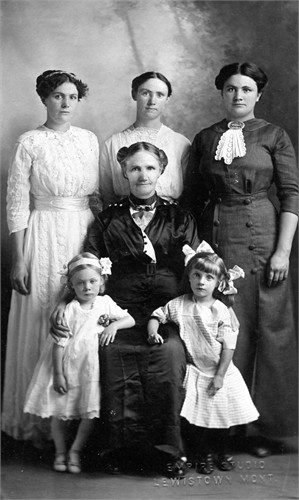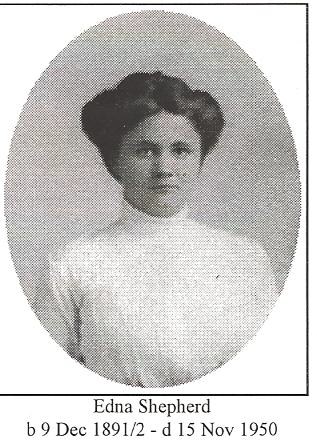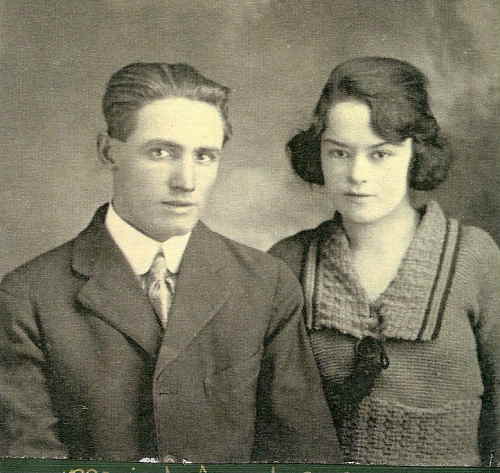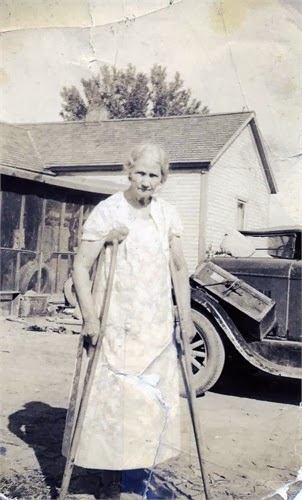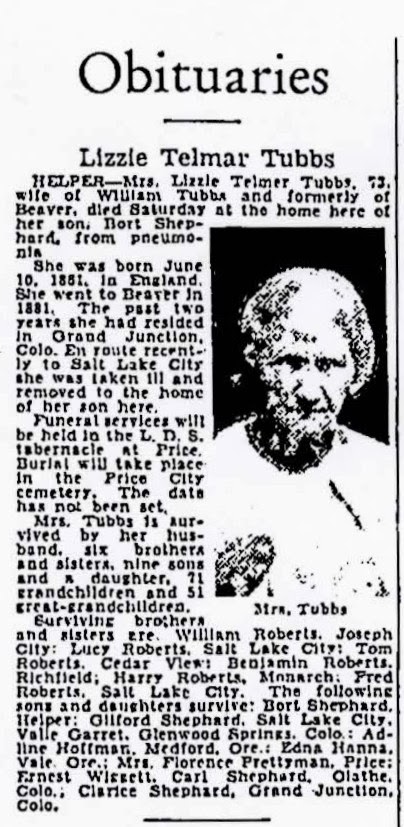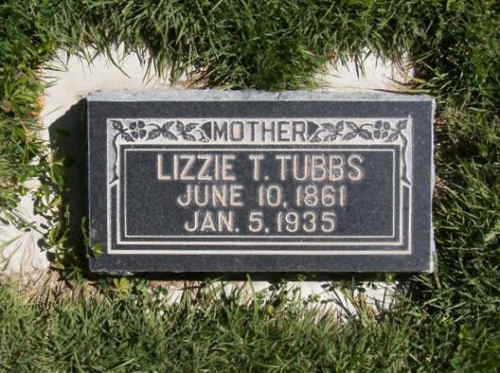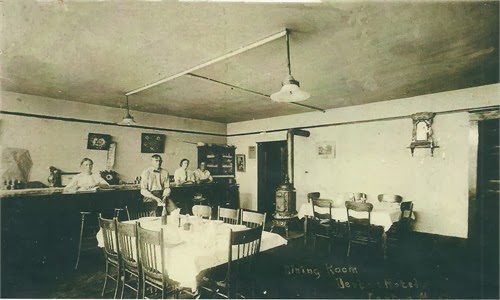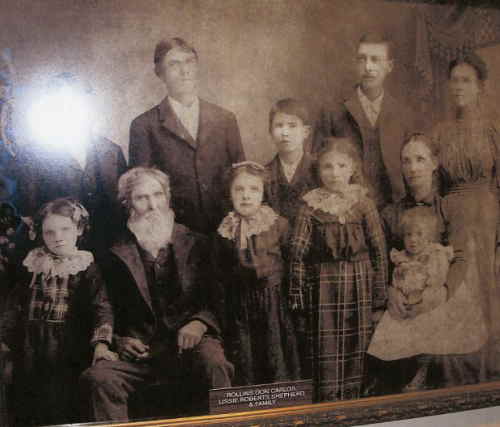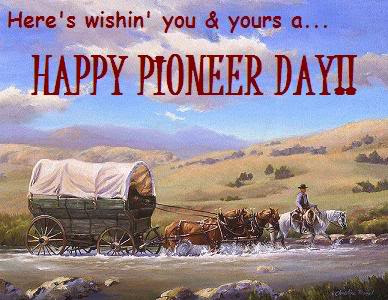Since February I have been sharing the story of my maternal second great grand aunt Elizabeth Talmer Roberts Shepherd. She was the sister of my maternal great great grandfather Abel Roberts. I chose Elizabeth “Lizzie”, because in delving into family geneology I had come across a comprehensive written story of her life. I was impressed by this young woman’s courage and strength. If you want to start at the beginning click here. If you have been following her journey scroll down for the next and final installment of Lizzie and her family’s journey.
Valie took Grace with her and went up on the train to be with Addie for a couple of weeks. Thelma and Grace had a lovely time together in the fall of 1914 when things became quiet for the winter. Lizzie rented out the hotel and took an extended trip. They went first up to Burley, Idaho where Claude and also Edna were living. They then took the train down to Salt Lake City and to southern Utah to visit Lizzie’s brother Will and Ben Roberts. Following that they traveled to Olathe, Colorado to get acquainted with some new family members that had been born there; James Earnest Louise Wiggett (DOB 11/28/1912), Rollins Don Carlos Shepherd III (DOB 02/07/1913) and Agnes Prettyman (DOB 03/01/1913). The family stayed with Carl until about the end of January and then returned to Burley on the train.
When they returned they found George and Edna Hanna had a new son, Calvin Grant Hanna (DOB 01/12/1915). Carl and Annie Shepherd also had a son born that spring, Lyman Shepherd (DOB 03/28/1915). Annie was not able to leave her bed after the birth of this child. The doctor diagnosed her problem as enlargement of the liver, but Valie believed she have had cancer. Annie (Mary Anna Abercrombia Shepherd) suffered a great deal and died about three weeks later on April 18, 1915 in a hospital in Montrose. She was buried on April 21st at Olathe, Colorado.
Lizzie and Valie took the train and returned in order to help Carl with the young family. It became apparent he could not work and care for seven children. Annie’s son, Ira Caldwell, was sent off by train to his sister Brazilla in Green River, Wyoming. Electra and 11 and Bertha 9, and they stayed with their father on the ranch at Olathe. Lizzie took the four smaller children back to Denton, Montana. Lora was about 7, Clara about 5, Carlos just past two and Lyman was a new baby only a little over a month old.
Claude and Francetta remained at Burley, Idaho that year and had their first son, Claude Albert Shepherd, born there on August 6, 1915. Over in Colorado, Earnest Wiggett and Carl Shepherd lived on East Mesa at Olathe. Mary Wiggett has a younger sister named Hattie May Kinnaman, who lived with their mother Ellazia York Kinnaman Marley in Delta. Hattie often came to Olathe to visit Mary. Carl took a job on Ash Mesa and boarded with the Markley’s while he worked on the canal. During this time he fell in love with Hattie. They were married at Mrs. Markley’s home in Delta, Colorado on January 16, 1916.
Meanwhile back in Denton, Montana, little baby Lyman Shepherd was ill all that spring. Although he was past a year old he could not stand on his feet and was ill until he died at age 14 months on May 1916. Lizzie asked the elders to have President Melvin J. Ballard come and conduct the funeral. He came and preached a very powerful sermon to the large crowd of towns people who came out of curiosity. Sometime later in the summer, Lizzie took the other three children back to Colorado. One cannot begin to understand the feelings of these young children who had lost their own mother, then just as they were getting settled into a life with their grandmother, were then taken back to begin life as members of a new family.
Sometime in 1916, Claude Shepherd decided to go to the Uintah Basin of Utah. According to history regarding Joseph Prettyman an Uncle Tom Roberts was running the post office at Cedar View, Utah. The Prettyman family arrived in Roosevelt about this same time and took jobs fencing land for the government Indian reservation in this area. About this same time Jim Peacock inherited $4,000.00 following the death of his father in England. He took this money and invested it with Claude on a piece of land near Red Cap, Utah. Claude build a small frame house for his family and Jim had a tent nearby. The following year another son, Robert Bartley Shepherd, was born to Claude and Francetta, on January 11, 1917.
Early in the spring of 1918, Lizzie rented a farm near Roosevelt, Utah. Both the Hanna family and the Huffman family, came up to the area. Two little cousins, Thelma and Grace, enjoyed walking to school together. Sometime early in April, as the girls came home from school, they waded in rain puddles and got very wet. Grace developed a case of croup and became very ill. The croup took her life in a few days and Grace Esther Shepherd died at the age of 6 on April 14, 1918. Bill Tubbs made the casket for her to be laid to rest in. The loss of this dear little girl was very hard for the family to accept.
Late in that same summer, George and Edna Hanna had another son, Harold Raymond Hanna, born at the ranch near Roosevelt, Utah on August 25, 1918. Also that same year Scott and Addie Huffman suffered a loss of twins. Addie had been having labor pains for about a week and was very ill. When the babies came on September 6, 1918, they were stillborn. The twin girls were given the names Adeline and Valie. They were buried at the foot of Grace’s grave in the Roosevelt Cemetery. Addie was very sick for about three weeks. She had always wanted twins and took the loss very hard. Valie stayed with her and took care of the family until Addie recovered and became stronger.
Late in the fall, most of the Shepherd family moved to Grand Junction. Addie became very ill. Valie went to the druggist to ask what they were using to help and he just shrugged and said “Nobody knows what to do.”, so she went to the grocery and bought a bag of onions and a bag of lemons. She made a big pot of onion soup and kept everyone drinking hot lemonade. Everett had a high fever and went out of his head talking about Grace. This alarmed his mother and the family very much. Many people were dying each day during this epidemic of flu. Everyone worried for several days that Addie would not have the strength to survive. Finally she and the others began to improve. However, when Francetta Shepherd got the flu in February, she was not so fortunate. This strain of flu seemed to be especially violent for young children and for women who were expecting. Francetta was one of these women, and after many days of being very ill she died. Francetta Kelsey Shepherd, only 23 years old, was buried at Roosevelt, Utah beside her daughter Grace on February 14, 1919.
Early in the spring of the same year, Claude moved his family to Grand Junction. It took him eight days to travel with his wagon from the town of Wellington in Utah, to Colorado. Both Bart and Claude went to work for the irrigation company in the area known as the Redlands South of Grand Juncton. Lizzie and Valie took care of the young boys. It was Grandma who raised Claude and Bob from then until manhood. Late in the fall , the family went to Olathe and spent the winter of 1919-1920 there. It proved to a be a pleasant winter as all the young people would get together at different homes for Saturday night dances.
About the middle of May, Valie returned to Grand Junction to be with Addie when her baby arrived. She and Addie were very close and she always looked forward to spending time with her family. She was there with them when the baby, Glen Huffman, was born on May 31, 1920. Early in June the rest of the family returned to Grand Junction. Scott and Addie were just getting ready to move out into the Redlands where Scott had taken a job with a ditch company. The company had a house for them. The Shepherd family moved into the house that they had been living in. Soon after this, Valie and Thelma were going downtown one day when they met John Garrett on the street. He had gotten a piece of steel in his eye, and had been to the doctor. He was wearing dark glasses to protect his eye for a few days. Soon he and Valie were going together again. He took a job irrigating on the Redlands too, and became a frequent visitor at the Huffman’s house.
That spring there was an epidemic of whooping cough. Florence, Nellie and Agnes Prettyman all had it. So did Marie Wiggett when her family came for a visit at Addie’s house. The older children would survive it, but a tiny baby did not have enough strength to endure the endless coughing. When Glenn began to get very sick, Addie called the doctor, He came and left a prescription slip. Valie walked out in the fields and asked him if he would take his care and get the filled for the, which he did. However, the baby died before the medicine could help him. Baby Glen Huffman passed away on June 31, 1920. Addie took the loss of this baby very hard. This was the third baby she had buried in less than two years. Claude stayed at Olathe until he had the crops all in. Then in the summer he traveled down to Grand Junction. He and Bill Tubbs got a big carpenter job over at Gateway, Colorado and they worked there until the last of August.
Sometime during the year before, when they were living in Grand Junction, Valie had met a girl named Maude McGovern. She had first met her at church. Later Valie went with Edna and George, and a group to a dance at Maude’s house. When Valie came home from this dance, she had told Bart that she had met his wife. Bart really laughed at this idea and said he was not very interested in girls and the idea of a wife was far from his mind. Valie had almost forgotten about this incident, since it was almost a year later. Soon they met up again with Maude following their attendance at the family wedding of Sarah Prettyman and Loren Craig on June 12, 1920.
After the wedding, Loren and Sarah were taking a group over to the store for a treat. In the group was Valie, John and Bart. On the way they met Maude. Valie introduced her to everyone else, ignoring Bart. Bart kicked his sister in the shin saying “Sis, aren’t you going to introduce me?” Valie responded “No, this is the girl you didn’t want to meet.” Then she said, “Maude, this is my brother Bart.” Maude talked for a few minutes, congratulations were expressed to Loren and Sarah Craig, then Bart and Maude linked arms and walked off together. They were together from that moment on throughout the rest of their lives.
It was not many days after this that John Garrett purchased a ruby engagement ring and presented it to Valie. When they announced their plans to be married soon, Bart and Maude thought it such a good ideas, that the two couples began to make plans for a double wedding. The wedding date was set for July 31, 1930, however, just a few days before the wedding Maude's step-father died, and her family convinced her she should wait until a later date. John and Valie went ahead and were married as planned at the home of Scott and Addie Huffman on the Redlands. They moved into a little house on Main Street and began housekeeping. John was working on the Redlands where he did irrigation work. The following Sunday afternoon, August 8, 1920, Bartley and Maude were married at the home of Maude's mother. In a few days they moved to a small house in West Camp of the Redlands, where Bart became an overseer of this irrigation camp.
About this same time, Claude and Bill Tubbs came back to Grand Junction from the job at Gateway, where they had been building houses. Just a month later the family had another wedding when William Tubbs married Lizze Shepherd on September 8, 1920. They were married at the elders place on Rude Avenue. John and Valie stood up with them.
After this group of marriages, there remained only person left to be married in the family, and since Gilford was only sixteen years old, he had a few years before he met and married Detta Arhea Norwood on May 5, 1924.
In December of 1934, George and Edna Hanna were coming to Salt Lake City, Utah to go through the temple and Lizzie decided to join them. They left Grand Junction, but somewhere out in the desert the old car broke down. They had to wait quite awhile in the cold before Bart was able to come from Helper and get them. Lizzie got chilled and became sick.
It was not long after Christmas that her cold turned to pneumonia. She was weak and tired, and her hip injury pained her a great deal. Elizabeth "Lizzie" Talmer Robert Shepherd Tubbs died on January 5, 1935 at the home of her son Bart in Helper, Utah. She was buried at Price, Utah on January 10, 1935.

